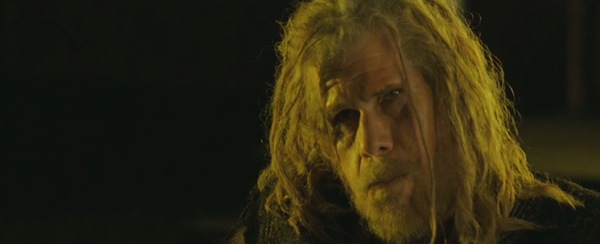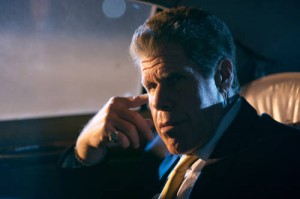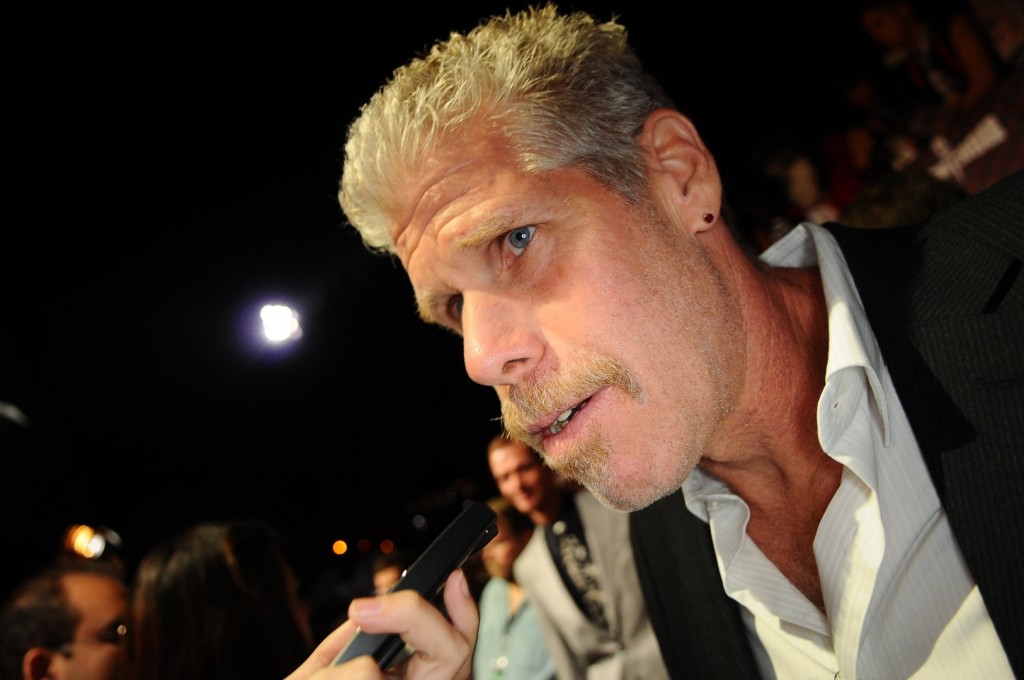
Speaking to people like Ron Perlman is why one does this kind of thing in the first place. Polite, articulate, expressive and just goddamn wise, Ron Perlman is everything you could ever want an interview subject to be. That he’s got interesting work to talk about on top of it is icing on an awesome cake that’s been awesome for a long time. His latest film Bunraku, which I chewed out a review of in last week’s video, is a very specifically styled movie in which Perlman plays a villain that looks a little bit like a Rob Zombie Santa Claus. He fashions himself as the manifestation of death in the film, and we talk a little bit about the universe of that film in which he fits. Beyond that we speak of his role in the amazing Drive, and his thoughts on the landscape of film release, and why a movie like The Help actually gives him hope for the industry…
___________________
Renn: So let’s talk about Bunraku! I finally got to watch it today and it’s definitely a very stylish, definitively unique piece of work.
Ron: Thank you.
Renn: How much did you know about what it would look like, feel like, the tone of it before you signed on? Was there a lot of concept art presented, or was it purely a script decision?
Ron: Well, you see the word “Bunraku” on a script and you think to yourself, “what the hell is a Bunraku?” And then you do some research and you find out it’s a highly stylized form of Japanese storytelling, which is kind of multi-media in nature– it has puppetry, it has paper-mache, it has elements of comic book storytelling. So you know you’re going to participate in something that is a very personalized vision on the part of the filmmaker, and you have no idea what that is ultimately going to end up looking like. But then when you add the content part of the equation, what happens in the storytelling, and you realize that’s going to be augmented in a very cinematic way then you jump in saying, “this could be a rather interesting experiment to be a part of.”
Renn: You have a long history of projects driven by distinct artistic visions, so what drew you most in to the project? Specifically the vision of the filmmaker or–
Ron: Yeah, the filmmaker had a highly articulated sense of what he was trying to do here– that this was a study of man’s innate and profound impulse to be cruel to his fellow man. So he set the story hundreds of years in the future, when all conventional weaponry has been banned from existence, so now we have guys who are fighting with the leg of piano or hat pins or toothpicks– they’re finding whatever ways they can to fuck up other guys. So the impulse for violence exists and can not be legislated. I thought that was a rather interesting story to tell and I thought that stylizing it and almost making it a dance of violence made it something rather unique, no one has ever taken that particular point of view before, and I wanted to be a part of it.
Renn: So you spent a lot of time on soundstages over in Romania, correct?
Ron: Yeah.
Renn: What was your experience over there and yet shooting on sets that were so stylistically engineered, with no location shooting?
Ron: Well it was my first time in Bucharest, I’ve done work in most of the satellite nations– The Czech Republic, Bulgaria, parts of the former USSR. I’ve worked in Croatia, Hungary. So, you know, you realize some of these countries came out of this horrific period of being overrun by communist regimes better than others, and Bucharest is going to be slow, evolving away from the horrific nature of that family that dominated them for all of those years– they did some horrible things to the spirit of the people, physically, spiritually, and emotionally. They’re gonna be slow to heal, and it was a little bit heartbreaking to see the remnants of that. They’re in perestroika now and part of a free market economy, so to speak, but like I said, some people are easier to heal than other.
Renn: Definitely seem to be some deep wounds in that country, were you able to witness any sings of growth or hope?
Ron: Well you know that eventually with the passage of time, that people will be able to embrace freedom and hopefully have the resources to be able to show for their efforts, that make their lives easier to bear. But they’re not there yet, and I guess there is a small population that are benefitting from the fruits of capitalism but then there are huge parts of the population that aren’t. You just hope that it happens sooner rather than later.
Renn: So when you’re stepping into a different reality on these sets and stepping into a –admittedly by your carer’s standards tame— combination of costume and make-up, how does that affect your thinking process and the resulting performance?
Ron: Well, we were all in the service of Guy Moshe’s vision. This was an impulse that sprung very personally out of him, and out of experiences that he’s had. So his need to tell the story in a way that was elevated and stylized was what we were all kind of participating in. So it was really important to me to keep checking in with Guy to make sure I was on the right track as to whether I was doing service to what he wanted to put on the screen. Everything else you just put blinders on and forget about the outside world and just do the job while you’re there to do it.
Renn: So one reason myself and so many CHUD readers have such a huge appreciation for your work is that you manage to strike a really great balance, and have for so long. This year alone you’ve shown up in a great big fantasy blockbuster, a smaller stylistic passion piece, and then something like Drive, which is almost a hybrid of the two. What’s sort of your driving… modus operandi for choosing parts? Is there an intentional balance you’re striking?
Ron: I’m just looking for people who are daring to be unique, and to not do anything that’s particularly derivative and formulaic. But I want to do things that celebrate the highly inspirational nature of what’s possible cinematically. I’m voraciously excited about being in the presence of guys like Nicholas Refn, Guy Moshe, Guillermo Del Toro, because they’re not making movies that are like anyone else’s movies, they’re making movies because they need to, and because they’re kind of driven with a great love of storytelling and a great love of putting everything they’ve personally ever loved or known into a distillation of the study of the human condition.
Renn: So when you’re considering taking on a project… I know some actors will take a role that’s not quite as well written if it’s part of an interesting whole or gives them a chance to work with a visionary filmmaker, whereas others will only take on new personal challenges. What’s your dealbreaker when pondering a script?
Ron: First of all, I have to feel I’m capable of playing the role. Second of all I have to feel I’m working around people who are doing it for the love of it, rather than some other network of reasons– whether they think it’s the right career choice or think it’s going to be a blockbuster or going to get award consideration. Those things are of no meaning to me. So that’s it. The material has to be smart, it usually has to be something I’ve kinda never done before so that it’s continually challenging me, putting me in places where I’m a little bit uncomfortable or have to reach beyond my grasp. That’s what makes for an exciting reality to me. And you know, it’s getting harder and harder to find because the marketplace is not rewarding iconoclasts at this particular moment in time as much as it has over the last 20 years, since the onslaught of Tarantino and all those great guys that came out of the 90s, when independent cinema was really flourishing.
 Renn: Speaking to that, when At The Mountains of Madness collapsed, being both a friend of Guillermo’s and someone in the industry, how did that make you feel?
Renn: Speaking to that, when At The Mountains of Madness collapsed, being both a friend of Guillermo’s and someone in the industry, how did that make you feel?
Ron: I wouldn’t say that it was a big surprise that the studio would be concerned about gambling on that scale, but it was really heartbreaking because I know how invested Guillermo is in telling that story, how invested he is in honoring H.P. Lovecraft finally, and how long and how much of himself he’s poured in to that project. I personally know that it must have shattered him even though he might not have ever shared that with the world at large, and I know that he was in pre-production for it for eight or nine months, he was ready to make that movie. It was just unfortunate that it didn’t get made. Not that it won’t at some point– I’m sure he’s determined to make it somehow, someway, some day. But it’s really tough on an artist when they invest themselves into something only to have it fall apart for all the wrong reasons.
Renn: I’ve got faith in him, we’ll see it one day I’m sure. But, to swing things back around to Bunraku, I always like to ask –whether I’m speaking with a filmmaker or just an invested observer– what are your thoughts on the way movies are being release? Bunraku is one of those potentially trailblazing movies that has been out on VOD, but also has a theatrical component. What is your perspective on these experimental release?
Ron: You know, I’m just an old fashioned guy. I love the days when a movie got made and it hit the theaters and then 8-months later it came on television, or went to DVD and then a few months after that came on television. I think movies are made to be seen in the cinema, it’s almost like one of our great American rituals where we sit collectively in a darkened room and have this communal experience that you can’t get at home. It’s a shame that the forces of the marketplace have dictated that those notions are no longer tenable.
Renn: Is that something you feel has been an inevitability, or a by-product of Hollywood’s poor choices and aversion to risk-taking? Could we be making more movies that would keep people drawn to the theaters, or is just on the wane?
Ron: Well let me just say this… the fact that there’s a movie out there called The Help, that was a tiny little movie about human beings interacting that was very moving and very well executed.. that it’s doing as well as it’s doing really encourages me. I wish that there were more people taking risks on projects like that, because I feel like if you make something great, people will go see it. But there’s such a gamble involved, there’s so many millions of dollars that have to go into the making of almost anything, that I can understand why things are the way they are, I just don’t have to like it.
Renn: Well I think a lot of people, including myself, are hoping that can happen to some extent with another little movie like Drive. It’s another small movie that’s gotten such a push of critical enthusiasm that deserves to go far. I was curious though, since the film has such a unique aura and tone and is so built on the relationship between Ryan and Nicholas… what was your understanding of the tone and the fantasy of that film when you entered in on the project?
Ron: Well, having read the source material, which was this little novella, film-noir novel by James Dallas and knowing what little I knew of Ryan and his desire to take it as much back to the source material as possible, and then knowing what little I knew about Nicholas and his maverick approach to storytelling, which is to never do the same movie twice, to never have anything resemble anything that he’s ever done before… I knew that this was going to be a very personal expression, and a very interesting expression in the hands of unbelievably capable people. My regard for Nick Refn, and likewise for Ryan Gosling, is almost inexpressible. They’re just the best on the planet right now. So I wanted to be a part of it on any level, and it just so happened there was this role of Nino, that they kind of bent to allow me to participate, and I’m really grateful that they did because that was a great thing to watch gestate in its many forms. You know he made three movies– what ultimately got on the page, what he ultimately shot, and then in the editing room he sculpted this perfect 90 minutes that no one else would have seen it like he saw. So yeah, it was very personal, very unique, very un-cookie cutter in the hands of an astonishingly important filmmaker.
Renn: I think he was able to do something so beautiful and so specifically crafted because the the really core genre elements were handled so well. It’s just a damn good crime film under the damn good art film, and that’s largely due to performances like yours and Mr. Cranston’s and Mr. Brook’s that strengthened the basic core of it and allowed him to slather his vision atop it. But in terms of working will Albert, who was enjoying his frist villainous screen role?
Ron: Well I think we were both approaching this coming from a very humble place. I was awed by the idea of working with Nicholas Refn, and I think Albert was as well. And I think Albert had the added gear to his awe of playing a gangster, something he’d never played before. Whereas I’ve played bad guys, I’ve played nefarious types before. I was watching him experiment in a color palette that was foreign to him, and it was really exciting to watch, and it was really exciting to be a part of. It was particularly exciting when it was him and me on screen together because you’re watching it happen as it’s happening, and you’re responding to it. It made for a very exciting kind of work experience.
Renn: Well before I lose you, what is generally on the horizon for you, and what can we look forward to seeing?
Ron: Well, finishing up the fourth season of Sons of Anarchy, which has begun airing. I have two more of those left to do. I have a movie coming out with Charlie Hunnam called Frankie Go Boom, in which I play a transgender. A fellow named Phyllis– an ex-fellow named Phyllis, which I found to be the funniest script I’ve read in 25 years, and that’s about it. There’s a bunch of things that we’re talking about for the hiatus, but none of them are announce-able quite yet, but you’ll be hearing about them.
Renn: We’ll be keeping an eye out. I really appreciate your time– it was an amazing talk, and it’s not everyday you get to speak to someone you’ve enjoyed for so long.
Ron: My pleasure my friend, it’s great talking to you as well. Give my regards to my old friend over there, at CHUD.
Renn: He’ll be happy to hear it.
Ron: Take care now.
Comment below
Message Board Thread
